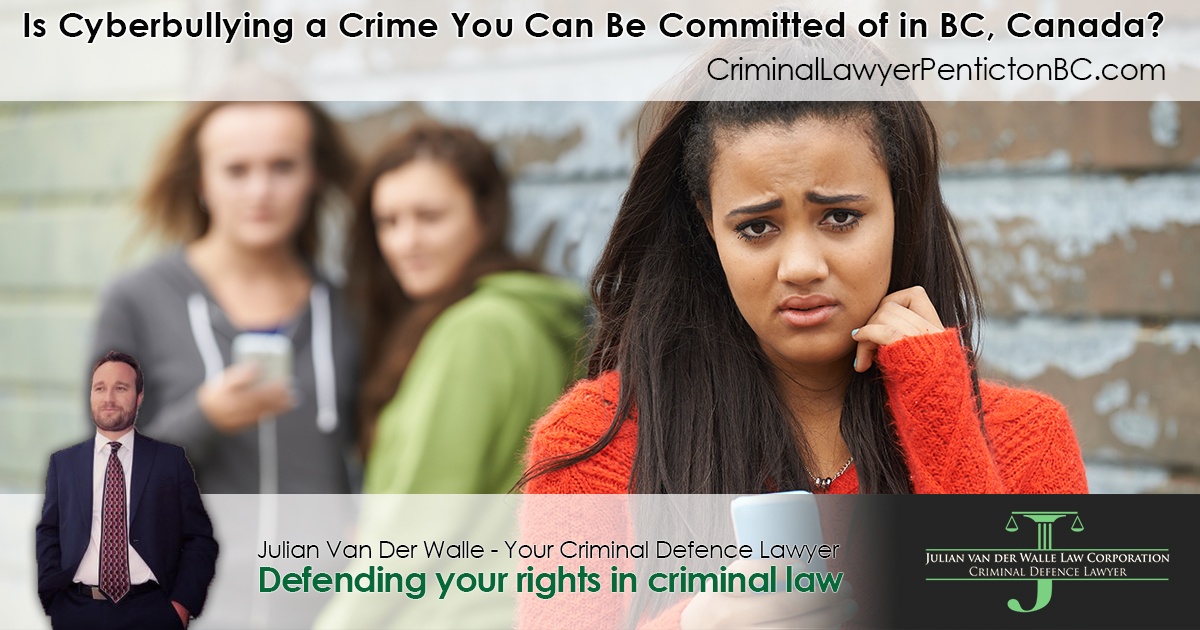Is Cyberbullying a Crime You Can Be Committed of in BC, Canada?

Cyberbullying has made headlines recently, in large part due to its connection to various heart-breaking suicides and attempts. In particular, the increase in suicides among teens and millennials is often attributed to instances of cyberbullying. Suicides are often not caused by any one event. Rather, many factors can contribute to a victim’s suicide. That said, in an age where the internet is the new center of many people’s lives, it has not become uncommon to view cyberbullying as a root cause of the current suicide epidemic.
What is Cyberbullying?
It is difficult to define cyberbullying because it can mean many different things to different people. It is also context dependent. Generally, cyberbullying refers to the harassment of someone else over the internet. Cyberbullying often happens through social media platforms like Facebook and Twitter. It can also occur in many other places, such as on online forums like reddit or even through more personal instant messaging platforms.
Cyberbullying is distinct from traditional forms of bullying for several reasons. First, traditional bullying is almost always accomplished in person through either physical or verbal abuse. Cyberbullying is different because it is accomplished almost exclusively through the written word or via webcam video chat. Second, cyberbullying is often much harder to get away from. Few cyberbullying victims can truly avoid their bullies because doing so would mean abstention from the internet. Such action is almost impossible in today’s world.
The Legal Consequences of Cyberbullying
Cyberbullying itself is not technically illegal in British Columbia. At least for now. Lawmakers have been considering legislation that will limit the impact of cyberbullying and deter the most serious forms of cyberbullying. An example of such a policy is Nova Scotia’s Cyber-Safety Act. The Nova Scotia Cyber Safety Act does not make cyberbullying a crime, but it does make cyberbullying a tort. A tort is a type of civil lawsuit that can be brought by a victim’s family members to attempt to seek financial compensation.
Similarly, British Columbia does not have a law that explicitly criminalizes cyberbullying despite significant interest in passing such a law. The problem is that most legislators who want to criminalize cyberbullying do not have an effective way to target cyberbullying specifically. Instead, legislatures have focused on the use of previously existing laws and policies as well as some new laws that aim to punish the most harmful types of cyberbullying.
The Passage of British Columbia Bill C-13
Canada recently passed cyberbullying legislation known as Bill C-13. As explained above, C-13 does not criminalize cyberbullying, but this law punishes one of the most harmful types of cyberbullying: the sharing of intimate images without the consent of those pictured. The non-consensual sharing of images is one of the most embarrassing and traumatizing forms of cyberbullying for victims. Victims who have had their intimate images shared online are often socially ridiculed and targeted for real-life bullying. It is all the worse that the perpetrators are often those whom the victim previously trusted.
C-13 seeks to punish those who share intimate images without the consent of the person who was photographed. Sharing such images is now a crime and can be punished by the authorities. The bill punishes the sharing of images over the internet. The law only punishes the sharing of intimate images. Standard non-consensual image sharing is still legal and is not generally considered cyberbullying.
Other Criminal Laws Related to Cyberbullying
In addition to C-13, other pre-existing criminal laws can be utilized to punish specific forms of cyberbullying. While these laws were not created with cyberbullying in mind, they are applicable to specific types of cyberbullying:
- Child Pornography: in addition to C-13’s ban on sharing intimate images without the consent of those pictured, child pornography remains illegal. This means that anyone transferring or publishing intimate images of children faces extra penalties.
- Criminal Harassment: harassment and stalking are two such activities that can rise to the level of crime if they are severe enough. Repeatedly tormenting another person online could hypothetically constitute criminal harassment if a cyber bully causes his or her victim to fear for life.
- Threats and Assault Laws: Making threats of force constitutes criminal assault and is illegal in British Columbia. Attempting to intimidate someone else over the internet is similar to threatening them in person.
- Identity Theft and Fraud: Creating a social media profile in someone else’s name may technically be identity theft and/or fraud, which are both punishable crimes.
Have you been charged with a crime related to cyberbullying?
Contact Julian today to help defend your case.
Related Stories
Why You Should Hire a Vernon Criminal Defense Attorney
As a whole, the Canadian justice system is very fair. The accused enjoy the right to be present and be heard in court, the right to remain silent, and the right to representation by legal counsel. That last right is one of the most important rights of all. This is...
Does drug addiction cause more crime?
Many in Canada often associate drugs with crime, and in many cases, the possession or use of drugs is itself a crime. More recently, a spotlight has been placed on drug-related incidents due to the opioid crisis afflicting the nation. Sociologists have spent decades...
Bad IRP Decision? What Can You Do About It?
Bad IRP Decision? What Can You Do About It? Drivers who are caught driving under the influence by the police may receive an Immediate Roadside Prohibition (IRP) on driving. An IRP is a temporary driving suspension that prevents the recipient from driving for a set...
REQUEST A FREE CONSULTATION
Call 1.866.706.8857
Or fill out the form below to receive a free and confidential initial consultation.
